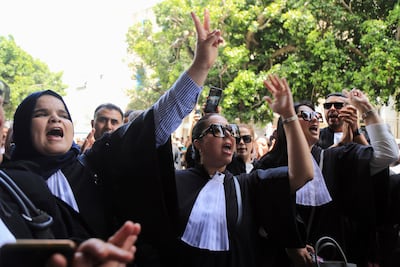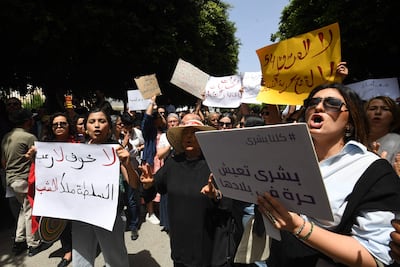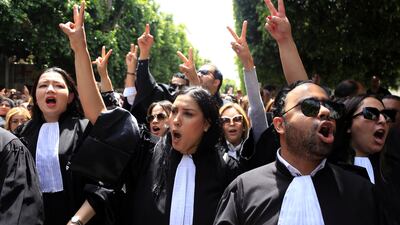Hundreds of Tunisian lawyers and civil society activists, rallied in the capital, Tunis, on Thursday against policies President Kais Saied and his government that they described as limiting freedom of expression, following an alleged crackdown on freedom of speech.
Protesters called on Minister of Justice Leila Jaffel to step down, accusing her of fostering a hostile atmosphere of arrests and calling out lawyers, journalists, activists and citizens for expressing critical views of the government.
Slogans included ‘What a great country! Torture and oppression,' Degage (get lost) and ‘no fear no terror, power belongs to the people'.
On Saturday and Monday evening, masked plainclothes officers were accused of raiding the Tunisian Lawyers’ Bar offices and arresting lawyers Sonia Dahmani and Mehdi Zagrouba. Lawyers said the raid happened without a warrant.
Ms Dahmani was arrested over charges relating to a statement she made on the migration crisis, while Mr Zagrouba was held on charges of assaulting a police officer.
Two Tunisian journalists, Mourad Zghidi and Borhen Bsaies, were also arrested this week on charges of making critical statements against the government, both online and on a private radio show.
Tunisian prosecutors said their words had featured misleading information and breached national security.

Tunisian lawyers accused authorities of illegal tactics during these arrests including the alleged torture of Mr Zagrouba, who was taken to hospital on Wednesday night after fainting during an investigation.
Tunisian authorities have denied that any torture had taken place and said that cameras are installed in detention areas to prevent any ill-treatment.
Tunisian lawyer and president of the Tunisian Human Rights League, Bassem Trifi, told The National that he had observed the physical state of detained lawyer Mr Zagrouba and alleged his injuries showed he had been subjected to a “heinous form of torture”.
Mr Trifi described the arrests of lawyers as “a clear message aiming to tame the voice of the legal profession”.
“Today we came here to send a clear message to say no to oppression, no to the infringement of legal proceedings, no to intimidation and no to torture,” he said.
Lawyer and vice president of the Young Tunisian Lawyers Association, Mohamed Ali Marzouki, accused the prosecution of refusing to provide medical attention to Mr Zargouba. The prosecution reportedly issued a jail order against Mr Zargouba while he was unconscious.
Tunisian Human Rights League
In a statement to Radio Mosaique, spokesman for the Ministry of Interior Faker Bouzghaya denied the allegations and said that Mr Zagrouba was not assaulted in any form, either during his arrest or where he is being detained.
Mr Bouzghaya said that Mr Zagrouba's lawyers were the ones who refused to bring a doctor and accused those making the claims of attempting to avert justice through promoting “fallacies”.
“Any person who provides false information or allegations without sufficient evidence will be prosecuted by the Ministry,” he said.

Several political and civil society activists joined lawyers in their protest.
Speaking to The National at the protest, political activist and member of the Alkotb political party, Chaima Jebali, said: “Tunisian lawyers have always been present throughout all major phases of Tunisia’s history, starting from the colonial era, the Ben Ali era and even through the post-revolution period.
“The legal profession has been a safety valve in the defence of Tunisians’ right to a fair trial, their dignity, their freedoms … assaulting lawyers is an assault on all of us and the regime needs to stop its assaults, explain itself and especially assume responsibility.”
Mr Saied denied any intention to confront the lawyers and said that the recent detentions have nothing to do with the legal profession. Instead, he said the detentions concern “those who dared to humiliate and degrade their country”.
“Those who degrade their country internally find protection both from foreign official and non-official circles,” Mr Saied said.
In the past few weeks, Tunisian public opinion has witnessed a growing polarisation, with many of the President’s supporters accusing public figures and antiracism activists of “treason”, claiming there is a plot to destabilise Tunisia and damage its national security.


